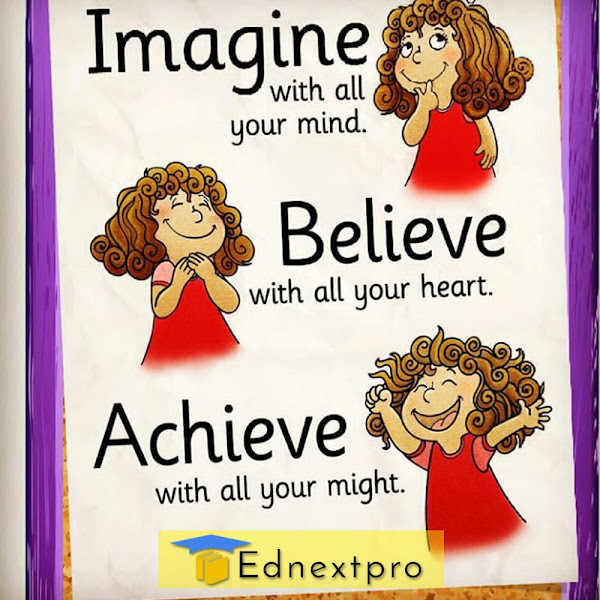Believe, Imagine, and Achieve
How is believing, imagining, and achieving related to teaching?
When I first started teaching, I never realized the power of using our imagination to visualize what we want out of the lessons that we are teaching.
I remember my SA asking me, 'Is this what you visualized would happen in the classroom?'
I told her, 'Yes, that is what I thought of.'
Then she said something like, 'I think you might want to keep working on it.'
Hence, imagination is the gate to figuring out the kinks of your lesson plan.
This will include figuring out what will the students do/say, where will they sit/stand, when will they move, what will you be doing, how will you say it, what signals will you use, how long will it take, what materials will you need, what extra support will you have/need, how to group he students, how you are going to assess, what sort of an assessment tool will you use and etc... There's a lot and a lot more that you cannot perceive happening such as accidents in the classroom, students not being engaged as you had expected, interruptions, emergencies, change of schedules, loss of time due to other events going on, and etc...
So having a plan is really utilizing our imagination to visualize as much of the possible scenarios and to choose the ones that we prefer to plan and carry out.
Now, here is an equally important concept to understand.
Let me repeat it again.
What you put out is what you get back.
This is where your beliefs come in about your own ability to fully put your lesson plan into action because as we teachers all know, the best moments are in those 'teachable moments' which cannot be planned but will more likely occur if we have a visualization of what can take place.
There's a saying, 'fake it until you make it' which is something that I suggest you do if you are not feeling confident about beginning to teach. There is something about when you imagine that you can do it and carry out those plans, it will feed into your own belief systems that you can do it. The more you visualize, imagine, and own it then you are matching that ability of what a teacher is. Every teacher brings a different skill set, demeanour, and effect on student's learning.
When I first started teaching, I never realized the power of using our imagination to visualize what we want out of the lessons that we are teaching.
I remember my SA asking me, 'Is this what you visualized would happen in the classroom?'
I told her, 'Yes, that is what I thought of.'
Then she said something like, 'I think you might want to keep working on it.'
Hence, imagination is the gate to figuring out the kinks of your lesson plan.
This will include figuring out what will the students do/say, where will they sit/stand, when will they move, what will you be doing, how will you say it, what signals will you use, how long will it take, what materials will you need, what extra support will you have/need, how to group he students, how you are going to assess, what sort of an assessment tool will you use and etc... There's a lot and a lot more that you cannot perceive happening such as accidents in the classroom, students not being engaged as you had expected, interruptions, emergencies, change of schedules, loss of time due to other events going on, and etc...
So having a plan is really utilizing our imagination to visualize as much of the possible scenarios and to choose the ones that we prefer to plan and carry out.
Now, here is an equally important concept to understand.
What you put out is what you get back.
Let me repeat it again.
What you put out is what you get back.
This is where your beliefs come in about your own ability to fully put your lesson plan into action because as we teachers all know, the best moments are in those 'teachable moments' which cannot be planned but will more likely occur if we have a visualization of what can take place.
There's a saying, 'fake it until you make it' which is something that I suggest you do if you are not feeling confident about beginning to teach. There is something about when you imagine that you can do it and carry out those plans, it will feed into your own belief systems that you can do it. The more you visualize, imagine, and own it then you are matching that ability of what a teacher is. Every teacher brings a different skill set, demeanour, and effect on student's learning.

Comments
Post a Comment
I appreciate all feedbacks including comments, questions, and suggestions. Comments will be moderated. Thanks for your understanding.